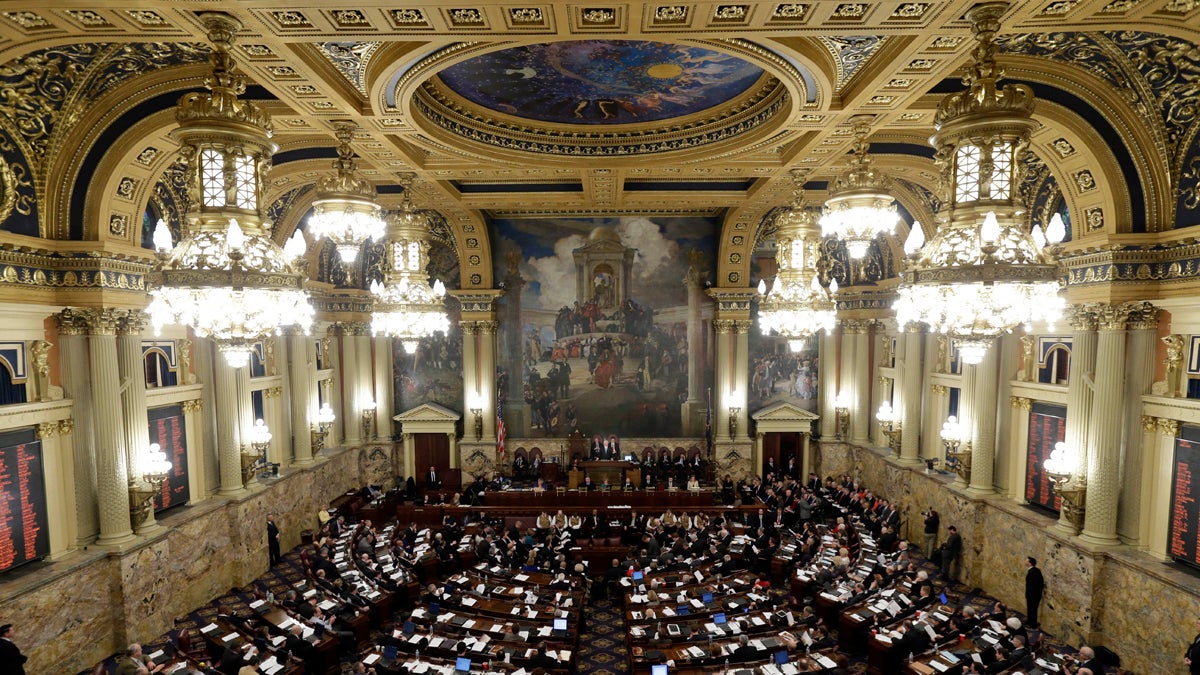If Pa. lawmakers actually represented Pennsylvanians, tax policy would make more sense

Gov. Tom Corbett is shown addresses a joint session of the Pennsylvania House and Senate in 2013, in Harrisburg, Pa. (AP Photo/Matt Rourke)
When I was in graduate school in political science many years ago, I had a teacher — a moderate Republican — who used to say that government in representative democracies is tricky because you can always ask, “who do the representatives actually represent?”
That’s a question all Pennsylvanians should keep asking during this year’s budget cycle.
Along with his bold plan to restructure Pennsylvania’s government and save $2 billion, Gov. Tom Wolf has put forward two proposals that will raise $375 million and take a small step towards fixing our broken tax system.
Taxes in Pennsylvania are upside down. At the bottom and middle of the income scale, Pennsylvanians pay 12 percent and 10 percent of their income in state and local taxes. The top 1 percent pay only 4 percent of their income. And while taxes have gone up on working people and the middle class in the last 20 years, taxes on corporations have been cut. It’s those cuts — and our whole broken tax system — not non-existent spending increases, that account for the $3 billion deficit we need to close this year.
One of the governor’s proposals is a severance tax on natural gas drilling. The other is a proposal to institute combined reporting of corporate taxes, while also reducing the corporate tax rate.
If our state legislators actually represented Pennsylvanians, these two proposals would fly through the legislature, for neither proposal will increase taxes on Pennsylvanians, but instead will raise revenues from people and corporations in other states.
The severance tax is partly paid by those who own the rights to, and drill for, natural gas — that is big corporations based in other states. And it is partly paid by consumers of natural gas. But because Pennsylvania’s natural gas is mostly shipped out of the state, Pennsylvania residents won’t pay the tax. Indeed, Pennsylvanians who purchase natural gas produced in other states already pay the severance tax of those states.
The corporate tax reform Wolf supports, combined reporting, would close the notorious “Delaware Loophole” that has long allowed 71 percent of multi-state and multi-national corporations that operate in Pennsylvania to escape from corporate taxation. Corporations like Wal-Mart and Toys “R” Us take advantage of the loophole by arranging their books to show no profit in Pennsylvania. They charge their Pennsylvania affiliates for goods sold here or for national advertising or for intangibles like the “good will” associated with their national brand at rates that allow them to show that they make no profit in Pennsylvania.
Combined reporting closes the Delaware Loophole by requiring corporations to attribute to Pennsylvania the proportion of their total profit that matches the proportion of their total sales that come from our state. Closing the loophole would enable the state to generate more revenues from corporate taxation at lower rates. Indeed, the governor wants the tax rate to eventually drop from the current 9.9 percent to 6.49 percent.
We think that is a bit too low. At a time when the state needs new revenue to close a budget gap caused in large part by reductions in corporate taxation, we need to make sure that the corporations pay their fair share of taxes.
But whatever rate the corporate tax eventually settles at, if we adopt combined reporting, we can lower that rate and still generate more revenue for critical investments in our state.
So state representatives and senators who oppose a severance tax and combined reporting need to explain who they represent when they vote.
Do they represent Pennsylvania consumers who now pay the severance tax of other states and won’t pay more if we institute one here? Or do they represent natural gas drillers and citizens from other states who will pay more?
Do they represent the Pennsylvania-based corporations who pay a very high corporate tax and who would benefit if combined reporting allowed us to reduce corporate tax rates? Or do they represent the out-of-state corporations who pay nothing now?
Of course, many representatives and senators will try to dodge the questions by claiming that both taxes will reduce jobs in the state. But it’s time to call them on these transparently untrue claims.
The natural gas in our state is not going anywhere. New wells will be drilled here, as they will in all the states that do have a severance tax, when the natural gas prices rise to the level that justifies drilling. A tax that makes up a small proportion of the cost of drilling will have very little impact on jobs in Pennsylvania.
Pennsylvania customers are not going anywhere either. Wal-Mart, Toys “R” Us and other retailers aren’t going to leave the state if Pennsylvania does what 25 other states do and institutes combined reporting.
So, when they take a stand on combined reporting and a severance tax, our representatives and senators will be telling us which side they are on. And that will also who whether it’s Pennsylvanians or out-of-state corporations who rule in Pennsylvania.
—
Marc Stier is the director of the Pennsylvania Budget and Policy Center.
WHYY is your source for fact-based, in-depth journalism and information. As a nonprofit organization, we rely on financial support from readers like you. Please give today.




